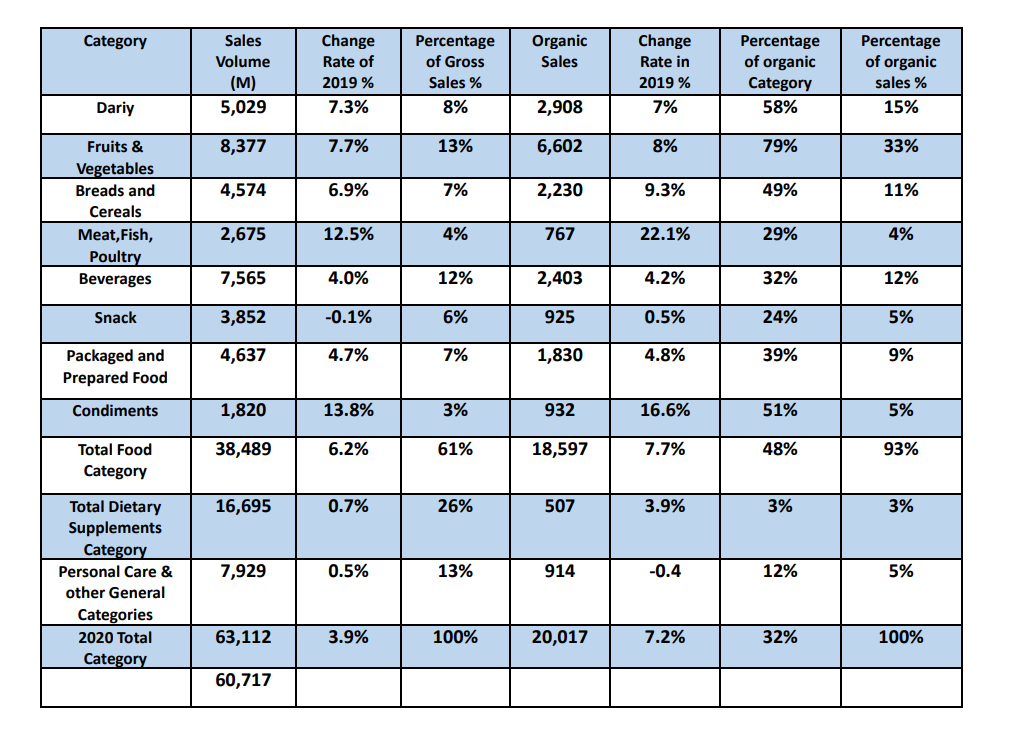Consumers’ demand for natural and organic products has increased significantly. In 2020, the total retail sales of natural products in the United States totaled 189 billion U.S. dollars. Among them, natural retail channels are US$63.1 billion, traditional retail channels are US$85.4 billion, e-commerce retail channels are US$15.9 billion, multi-market retail channels are US$12.7 billion, mail-order retail channels are US$5.1 billion, and other retail channels are US$6.5 billion. Mainly food, frozen food, meat, poultry and fish, and plant-based products. The fastest-growing natural channel is condiments and meat, of which organic meat, fish, and poultry have the fastest growth.
Many independent natural retailers have seen significant sales growth in 2020 as consumers hoard a large amount of food to cook at home, avoid dining at restaurants and focus on their health and nutrition needs. At the same time, the pandemic has forced retailers to adjust their operational strategies, from complying with changing health and safety protocols to adding e-commerce functions and improving bulk and prepared food products.
Figure 1: Product sales of natural retail channels in 2020

1 The market for dietary supplements has soared
The global epidemic of the new crown epidemic has prompted consumers to pay attention to basic health. Vitamin sales occupy the first place in 2020. At the same time, as consumers stay at home for a long time, sports nutrition supplements, which were hot spots in the market a year ago, have been hit. Weight management, stress relief, and sleep health have become hot trends in the post-epidemic era.
Figure 2: Sales of dietary supplements in 2020

Take the pressure-relieving market as an example. In May 2020, the average stress level reported by American adults on the 10-point scale was 5.9, which was higher than the average stress level reported in 2019 of 4.9. This is the first significant increase in reports since the survey began in 2007. At the same time, during the epidemic, approximately 46% of American parents reported that stress reached a 10-point scale between 8 and 10, with 1 indicating almost no stress.
Studies have shown that stress affects our mood, sleep, energy levels, and mental health. However, when stress persists or persists for a long time, recent studies have confirmed that it can also affect the health of the brain, digestive system, nervous and immune systems, and heart.
2 The growth of the food category in the natural channel field is “stable”
From avoiding alcohol and caffeine to cooking more at home, people tend to be healthy and seek healthier solutions. The following is a view of natural product retailers on the comparison of food sales in 2020 and 2019. As consumers increase their cooking at home and develop an interest in baking, most retailers have experienced moderate but significant growth.
Figure 3: Compared with 2019, the growth of food sales in 2020

In contrast, most organic food sales in 2020 experienced moderate growth. The following are the results given by natural product retailers compared to 2019.
Figure 4: Compared with 2019, the growth of organic food sales

Retailers of natural dietary supplements said that a quarter of retailers in 2020 experienced a growth of more than 20% compared to 2019.
Figure 5: Compared with 2019, the growth of dietary supplement sales in 2020

With the recovery of the epidemic, the concept of natural health products has been deeply rooted in the hearts of the people. In 2021, natural and organic product market sales will continue to grow.
3 The “definition” of natural retail stores
3.1 Natural products store:
More than 60% of the income of these stores comes from food. They are usually the largest stores on the market, offering a wide range of products, from nutritional supplements and body care to groceries to frozen products. Most of these stores have large pet supplies and household goods areas, and catering services (bakery and deli shops) are also common.
3.2 Health Food Store:
More than 20% of the sales revenue of these stores comes from food, and more than 50% of the sales revenue comes from a combination of food and nutritional supplements. Typically, they are smaller than natural products stores, although they also have groceries, cold drinks, and freezing areas, which may be smaller, with the exception of nutritional supplements and body care areas.
3.3 Dietary supplement store:
As the title indicates, these stores focus on dietary supplements, with at least 60% of sales coming from dietary supplements and less than 20% of sales coming from food. The main products they provide are dietary supplements, usually some body care, and possibly small grocery stores (drinks and snacks). They are also the smallest stores in terms of retail space.

